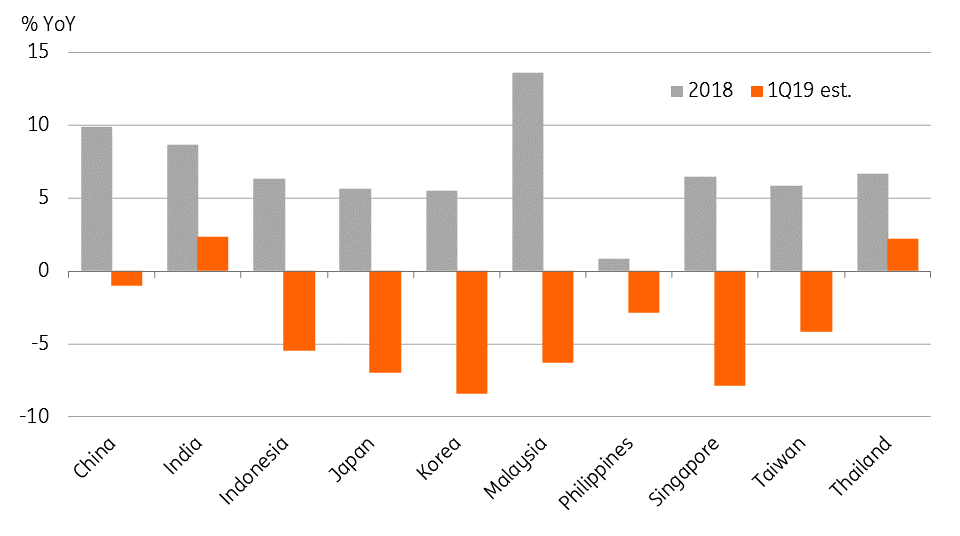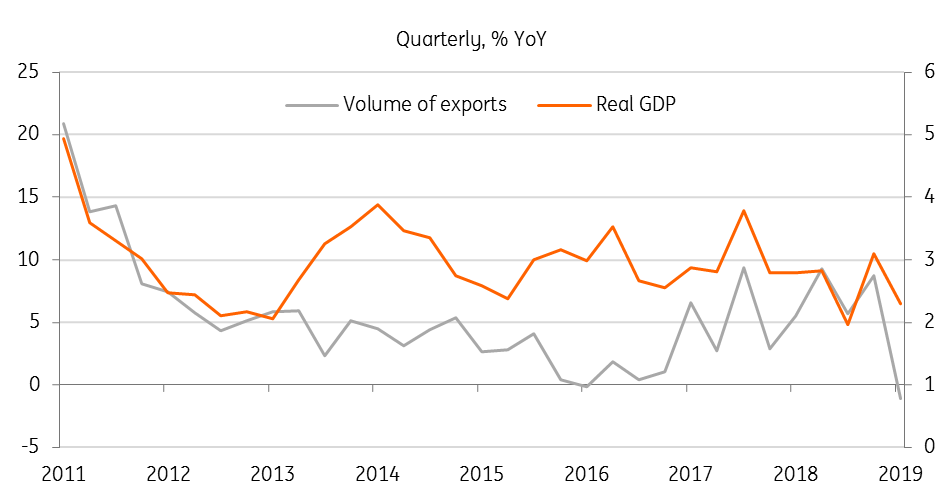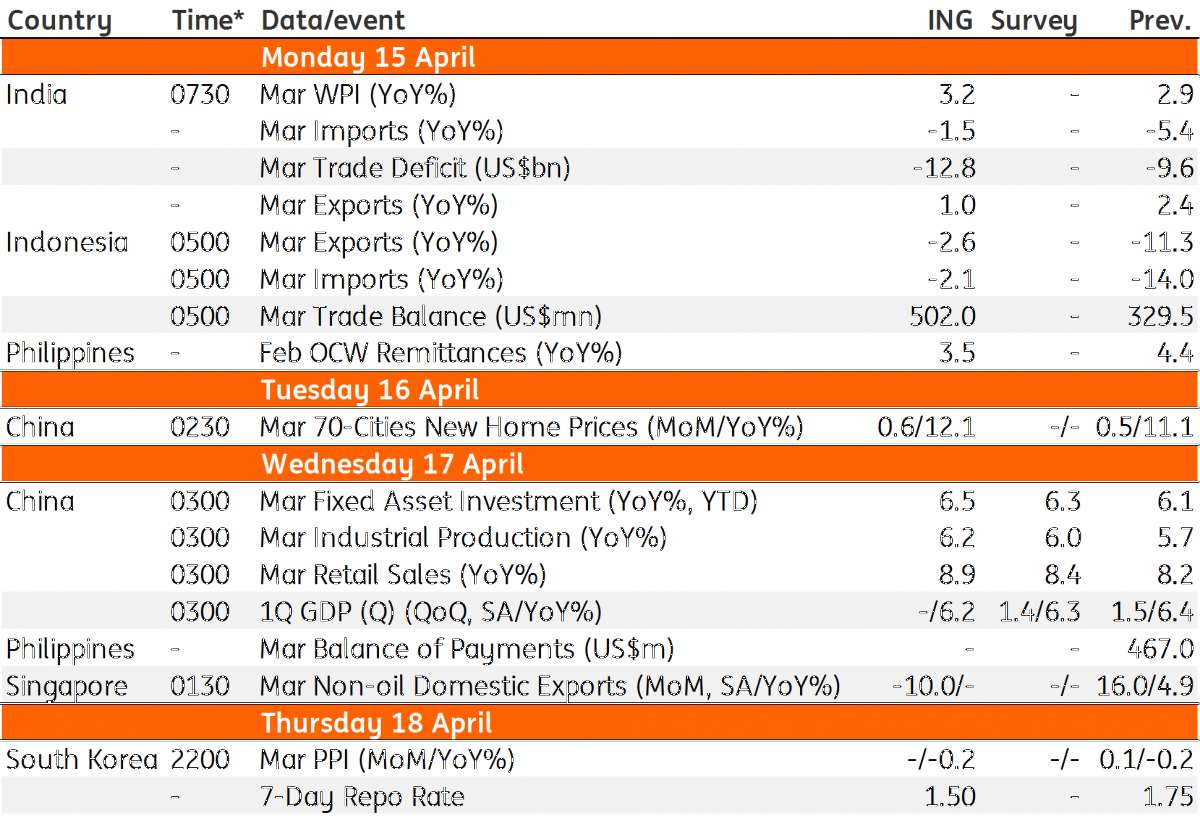Asia week ahead: China and Korea in the limelight
China’s 1Q19 GDP and Korea’s central bank policy meeting are the highlights of next week. The fiscal stimulus has put the Chinese economy on course to a soft-landing but the trade war seems to be hitting other Asian economies harder, with the Bank of Korea likely moving to curtail the export-led economic slowdown with a rate cut
China's 1Q19 report card arrives
The International Monetary Fund's upgrade to the Chinese growth outlook for 2019 this week is a validation of the soft-landing of the economy amid prevailing trade tensions. This comes as macro policy in China has been geared towards preventing a significant growth slowdown. China's GDP report for the first quarter of 2019 will be a testimony of this view next week.
Other economic indicators including industrial production, fixed asset investment, and retail sales, for March - also due next week - are pointing to moderate GDP growth.
However, despite the higher tariffs in 2018, Chinese exports were by far Asia's outperformer with about 10% annual growth. Against this backdrop, some negative trade growth was inevitable. But so far there isn’t a whole lot negative, at least judging by the consensus trade forecast for March (data due on 12 April), which implies less than 2% contraction in both exports and imports from a year ago.
As such, we consider our forecast of 6.2% GDP growth in 1Q19 at risk of an upside surprise. The consensus estimate is 6.3%.
Asian exports growth

Korea – Conditions are ripe for a rate cut
We may be an outlier in our forecast of a Bank of Korea policy rate cut next week, especially just months after a 25 basis point hike in November.
The factors underlying our view are accelerated export weakness depressing GDP growth and low inflation opening the doors for policy support for the economy via lower interest rates. Over 8% fall in exports in 1Q19 from a year ago was probably the worse among Asian countries. Undoubtedly, it should have caused a dent to GDP growth from 3.1% posted in 4Q18 (ING forecast is 2.3% for 1Q19, data due 25 April).
The central bank also releases its quarterly economic outlook report on the same day as the policy meeting. We anticipate yet another downgrade to the central bank’s growth, and inflation forecasts – last cut in January puts GDP growth forecast at 2.6% and inflation at 1.4%. If so, it might as well cut the policy interest rate at the same time rather than waiting for the downtrend to intensify further.
Exports drag Korean GDP growth lower

Asia – more trade figures ahead
The week is also heavy on March trade figures from India, Indonesia Japan, and Singapore – all possibly pointing to greater downside growth risk to Asian economies.
In view of high trade deficits, data from India and Indonesia will be closely watched as these economies and their respective currencies sway. A double-whammy of slowing exports and elevated imports owing to their strong domestic demand and rising fuel import bill with the higher oil prices point to no respite in the near term. Singapore’s export trends seems akin to Korea’s, both dragged down by the global technology slump and depressing GDP growth.
And alongside all of this, Asia's two most populous countries – India and Indonesia head to the polls.
| -12% |
ING forecast of Singapore's March NODX growthYear-on-year |
Asia Economic Calendar

Download
Download article
12 April 2019
Our view on next week’s key events This bundle contains 3 articles"THINK Outside" is a collection of specially commissioned content from third-party sources, such as economic think-tanks and academic institutions, that ING deems reliable and from non-research departments within ING. ING Bank N.V. ("ING") uses these sources to expand the range of opinions you can find on the THINK website. Some of these sources are not the property of or managed by ING, and therefore ING cannot always guarantee the correctness, completeness, actuality and quality of such sources, nor the availability at any given time of the data and information provided, and ING cannot accept any liability in this respect, insofar as this is permissible pursuant to the applicable laws and regulations.
This publication does not necessarily reflect the ING house view. This publication has been prepared solely for information purposes without regard to any particular user's investment objectives, financial situation, or means. The information in the publication is not an investment recommendation and it is not investment, legal or tax advice or an offer or solicitation to purchase or sell any financial instrument. Reasonable care has been taken to ensure that this publication is not untrue or misleading when published, but ING does not represent that it is accurate or complete. ING does not accept any liability for any direct, indirect or consequential loss arising from any use of this publication. Unless otherwise stated, any views, forecasts, or estimates are solely those of the author(s), as of the date of the publication and are subject to change without notice.
The distribution of this publication may be restricted by law or regulation in different jurisdictions and persons into whose possession this publication comes should inform themselves about, and observe, such restrictions.
Copyright and database rights protection exists in this report and it may not be reproduced, distributed or published by any person for any purpose without the prior express consent of ING. All rights are reserved.
ING Bank N.V. is authorised by the Dutch Central Bank and supervised by the European Central Bank (ECB), the Dutch Central Bank (DNB) and the Dutch Authority for the Financial Markets (AFM). ING Bank N.V. is incorporated in the Netherlands (Trade Register no. 33031431 Amsterdam).
